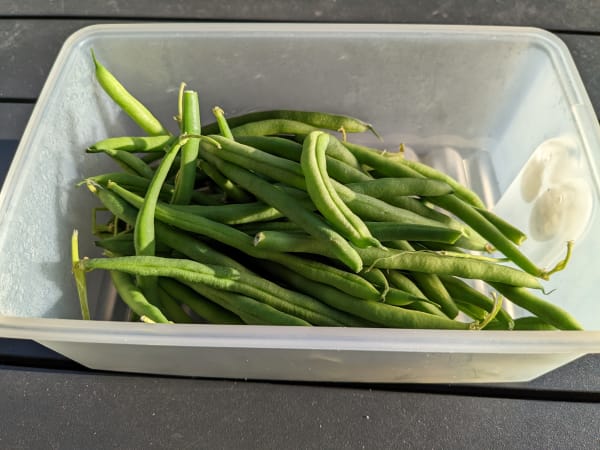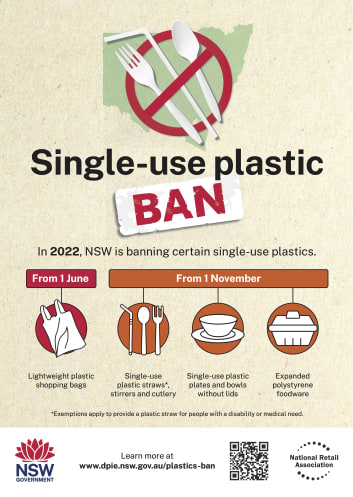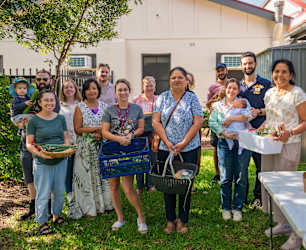Over many years, we have become accustomed to buying and storing our food and drinks in plastic packaging. A versatile and useful product, plastic is threatening our natural environment. Its durability means that it takes many years to degrade. Although some plastics are recyclable we know that a very small proportion of plastics sold are recycled.
In 2020, The Australian Bureau of Statistics reported that Australia generated 2.5 million tonnes of plastic waste in the 2018-19 financial year. Of that, 84% went to landfill, and households were the largest contributor. In NSW alone, we generate 800,000 tonnes of plastic each year and 10% is recycled. Plastic packaging and single-use plastic items make up 60% of all litter in NSW.
You may have noticed that the NSW Government recently banned several categories of single-use plastics. From 1 November, businesses and community organisations must stop supplying single-use plastic straws, stirrers, cutlery, plates, bowls and expanded polystyrene foodware. Exemptions include plastic bowls with spill-proof lids, serving utensils or serving ware and pre-packaged items like those integrated into the packaging of a food or beverage product.
Also banned are single-use plastic cotton buds and personal care products containing microbeads. This follows the banning of lightweight plastic bags from 1 June this year. Exemptions include heavyweight reuseable bags, barrier bags that protect unpackaged food, bin liner bags, human or animal waste bags, produce bags, bags used for medical purposes and sealed product packaging bags.

This phased rollout of single-use plastic bans is all part of the NSW Plastics Action Plan, which was released in June 2021. One outcome of the plan is to reduce plastic waste generation, which has occurred over the two phases introduced this year. The government is committed to reviewing the use of plastic plates, bowls and cups, including lids, degradable plastics, fruit stickers, heavyweight shopping bags and barrier/produce bags in three years.
Other outcomes include making the most of our plastic resources, reduced plastic “leakage” (cigarette butts and microbeads) and the support of research to improve our understanding of the future of plastics.
For more information on single-use plastic bans and exemptions, go to the EPA website.
The National Retail Association is hosting weekly webinars for businesses to find out more about the bans.
How to avoid plastic when buying food
Try these 3 low-plastic grocery stores in the Illawarra.

1. The Source Bulk Foods
146 Crown Street, Wollongong, NSW, 2500

2. Flame Tree Co-op
355 Lawrence Hargrave Drive, Thirroul, NSW, 2515

3. Heart & Sol Organics
106 Terralong Street Shop 24, Kiama, NSW, 2533
How to avoid plastic when storing food
If you know the five Rs – refuse, reduce, reuse, repurpose, recycle – the best way to avoid plastic is to refuse the plastic packaged item. Many people have already started to do this by swapping plastic bags with reusable alternatives made from sustainable materials. The Wollongong City Council website has great ideas for going beyond plastic bags.
A study by British sustainability organisation Wrap refutes the idea that fruit and veg needs to be stored in plastic packaging to remain fresh. In fact, they found that there was likely to be more food waste as people may buy more than they need, particularly with pre-packaged bags – think apples and potatoes.
The study looked at the fridge life of five items – apples, bananas, broccoli, cucumber and potatoes – stored in their original packaging and loose, at different temperatures. The recommendations included buying loose items, only as much as you need, and storing them at home below 5˚C. This not only reduces food waste but reduces the amount of plastic.
Here's how to store fresh produce without using plastic bags:
- Pack into sustainably made reusable plastic containers that last for many years and put in the crisper
- Wrap herbs and other soft greens in a damp tea towel (mint and basil are the exceptions as the leaves will turn black) before sealing into a container and pop into the fridge
- Place herbs in a glass of water on the kitchen bench (replace the water often)
- Rinse salad leaves and dry in salad spinner or on a clean tea towel and store in an airtight container in the fridge
- Blanch and freeze veggies like broccoli and cauliflower in reuseable plastic containers

I highly recommend a book called Use It All, which is produced by the team from Cornersmith, a family-run business with a café in Annandale and cooking school in Potts Point. This book has great tips for both storing fresh food and using it up in creative ways. They have a new book out too, Food Savers A-Z.






